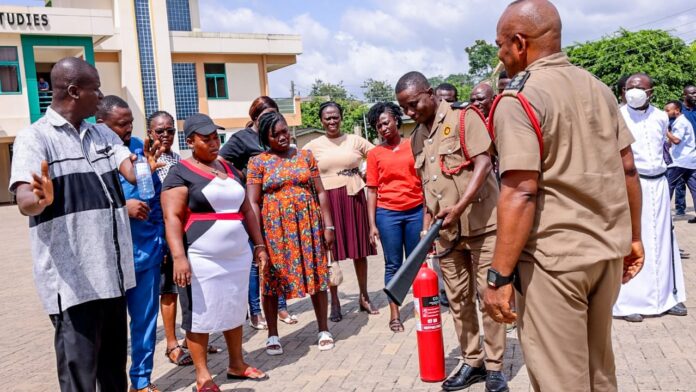The School of Petroleum Studies at the University of Mines and Technology (UMaT) Tarkwa organized a workshop to disseminate research results on the safety assessment of the Liquefied Petroleum Gas (LPG) supply chain. The theme of the workshop focused on ensuring the safety and sustainability of clean energy in Ghana, particularly in the Western region.
Funded by the Ghana Chamber of Mines Tertiary Education Fund, the research delved into communities in the Western Region, including Tarkwa, Takoradi, Asankragu, and others. Stakeholders from diverse sectors, including DVLA, GPRTU, Ghana Fire Services, NPA, and hotel owners, participated in the workshop to discuss critical aspects of the LPG supply chain.
The primary objective of the research was to identify safety and technical issues associated with the existing LPG supply chain. During the welcome address on behalf of the Dean, Office of Research, Innovation, and Consultancy (ORIC), Prof Michael Affam, the Dean of Planning and Quality Assurance Unit of UMaT, Professor Solomon Nunu highlighted the crucial support provided by the Ghana Chamber of Mines Tertiary Education Fund.
he said, “Since 2019, the fund has played a vital role in supporting faculty members and postgraduate students, contributing to building human resources capital for the mining industry”.
Professor Richard Amorin, the vice Dean of the School of Petroleum, emphasized a notable finding from the research – a lack of basic knowledge on the safe usage of LPG among domestic users in the Western region. Following this discovery, the research team recommended that the government’s ambitious goal to increase access to domestic LPG usage to 50% by 2030 should be accompanied by robust safety protocols. This, they believe, will help minimize LPG-related casualties recorded in the country.
During the workshop, the Municipal Fire Commander, Divisional Officer II Alex Assiem, highlighted crucial safety measures. He emphasized that LPG cylinders should be transported in an upright position, and proper storage in well-ventilated areas is essential to prevent the accumulation of gas vapors.
The workshop served as a platform for collaboration among various stakeholders, fostering a collective effort to enhance the safety and sustainability of the LPG supply chain in the Western region and contribute to the broader national goal of clean energy usage.
Source: Seraphina Quaicoe/myinfotoday.com/UMaT

